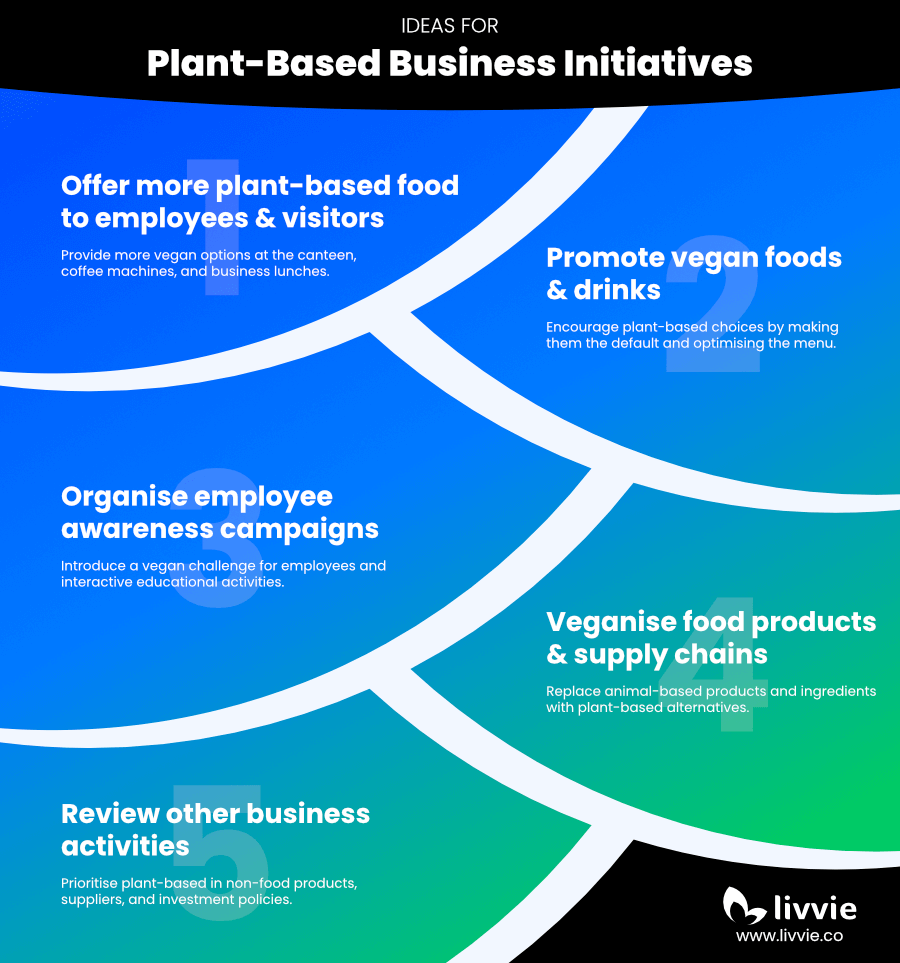Plant-Based Food Initiatives for Any Sustainable Business
Written by Johanna van Langen
Published 4 September 2024
Corporate responsibility is becoming a priority and adopting plant-based food in business operations can contribute substantially to social and sustainability goals. Regardless of your industry, any business can organise initiatives to drive the transition towards a sustainable plant-based food system.
This blog provides actionable ideas for integrating vegan food in your company culture, employee diets, and business activities. Continue reading to explore initiatives for incorporating plant-based food across your business operations, from the office canteen to your supply chain.

Inspire your plant-based business initiatives with impact data
1. Offer More Plant-Based Food to Employees and Visitors
Initiatives to offer more vegan food options at your workplace are a straightforward way to enhance inclusivity while promoting plant-based food choices to employees and visitors. Normalising plant-based food in your business operations helps to advance your Environmental, Social, and Governance (ESG) goals.
Many people today avoid animal products for various reasons, including health, environmental concerns, animal welfare, or cultural background. Of European consumers, 12% identify as vegan, vegetarian, or pescatarian, suggesting that many of your employees and visitors may follow such diets. By offering diverse plant-based options, you cater to these dietary preferences, fostering an inclusive, vegan-friendly workplace.
With 27% of Europeans following a flexitarian diet, there’s a growing trend towards reducing meat consumption. Providing a range of delicious vegetarian and vegan options at the office makes them more accessible to flexitarians and omnivores. This encourages acceptance and adoption of healthy, sustainable plant-based food as part of your company culture.
More Vegan Menu Options in the Canteen
While vegetarian choices are common in office canteens, finding a nutritious vegan meal can be a challenge. Collaborate with your catering team to provide a variety of appealing vegan dishes on the menu to encourage employees to choose plant-based.
Vegetarian or Vegan Days
Introducing a weekly vegetarian or vegan day such as a “Meatless Monday” is an effective way to serve more plant-based food. This allows all employees to explore plant-based dishes in an approachable way, while reinforcing your commitment to sustainability.
Plant-Based Ingredient Swaps
Replacing commonly used animal-based ingredients such as condiments with plant-based alternatives can be a quick win. This can also streamline kitchen operations and make it easier to accommodate guests with dietary restrictions.
Plant-Forward Business Lunches and Events
When arranging catering for business lunches or corporate events, consider setting a minimum percentage of plant-based options. For dining out with employees or clients, book a restaurant with a vegan-friendly menu. This accommodates dietary needs and demonstrates your organisation’s dedication to inclusivity and sustainability.
Plant-Based Milk in Coffee Machines
Encourage plant-based choices at the office by providing alternatives such as soy, almond, or oat milk in coffee machines. Ensure these options are readily available and clearly communicated to employees.
Vegan Snacks
Make sure that your workplace’s snack options include vegan options. This can be as simple as adding plant-based snacks to vending machines, making it easy for employees to grab something quick and nutritious.

2. Promote Vegan Foods and Drinks
You can apply several marketing strategies to promote and sell more vegan food to employees. This can boost the transition towards a more plant-forward food culture and support corporate sustainability efforts.
Make Plant-Based the Default
One of the most effective ways to encourage plant-based food choices is to make them the default option. Normalising vegan or vegetarian meals as the standard makes employees less likely to request alternatives. For example, in the canteen you can make the daily special a plant-based dish. When offering both vegan and meat-based meals, present the vegan option as the primary choice.
This approach can also be extended to other areas, such as the office coffee corner. Consider offering plant-based milk as the default choice, or even phasing out dairy milk altogether. For corporate lunches, instruct your caterer to prioritise plant-based meals, with meat options available only upon request.
Optimise the Menu to Promote Vegan Options
How you present vegan options influences buying behaviour and there are a few ways to optimise the menu to promote vegan options. Instead of isolating vegan dishes in a separate section, integrate them into the main menu. On digital displays such as those on coffee machines, list plant-based options first to increase their visibility. If food is on display, give vegan dishes a prominent position to catch the eye of employees.
The language used to describe these options also matters. Focus on emphasising the taste and quality of the dishes and avoid using restrictive labels such as “vegan” or “vegetarian.” Using terms like “plant-based” can make these meals more inclusive.
Use Positive Marketing Messaging
Promote vegan foods with positive messaging in the canteen and across your digital platforms. Through targeted campaigns, highlight the positive impact of plant-based foods on health, the environment, and animal welfare. Marketing messaging can also support awareness campaigns or vegan challenges and help shift perceptions to influence consumer behaviour.
Provide Financial Incentives
Financial incentives can be a powerful motivator for choosing plant-based options. Pricing vegan dishes lower than their meat-based counterparts can encourage more employees to choose them. Additionally, you could implement a rewards program where employees earn points for every plant-based purchase, redeemable for perks or discounts.
Align with your caterer to ensure the pricing strategy supports your initiatives and reflects your company’s commitment to promoting sustainable and healthy food choices.

3. Organise Employee Awareness Campaigns
Transitioning your business towards a more plant-based food culture starts with raising awareness among employees about its benefits. Educating your team about the positive impact of vegan food on the environment, society, and personal health can inspire them to embrace it.
Vegan Challenges in the Workplace
Introducing a collective vegan challenge is an excellent way to grow awareness while building a sense of community among employees. Consider participating in global initiatives like Veganuary, which encourages people to adopt a vegan diet during January. Veganuary also offers support for organisations through their Veganuary Workplace Challenge. If a month is too ambitious, you can organise a vegan challenge week.
Follow best practices for organising Veganuary or other vegan challenges, like making sure the challenge is inclusive for all employees. Don’t expect perfect adherence to a vegan diet, but instead motivate participants by celebrating small changes such as reducing meat intake. Show how even small steps towards a vegan diet make a substantial impact on the planet, their health, and animal welfare. Tracking the dietary choices of participants allows you to calculate the positive social impact of your vegan challenge.
Employee Awareness Campaigns
Running educational campaigns is another effective way to grow awareness about the benefits of plant-based food. You can organise a variety of activities to engage employees and increase their knowledge.
Host webinars that cover the environmental, health, and ethical advantages of a vegetarian or vegan diet. Invite guest speakers to provide expert insights and encourage open discussions to address any concerns or misconceptions.
Build an internal community where employees can share resources, recipes, and practical tips. Use your company’s communication channels to distribute informative content and enable an ongoing dialogue about a plant-based lifestyle.
Organise hands-on events like vegan cooking workshops, team dinners, or potlucks. These activities demonstrate the versatility of plant-based cuisine and strengthen team bonds.
These initiatives can be implemented to support a vegan employee challenge, creating a comprehensive educational experience. By empowering employees with knowledge and practical skills you inspire them to make informed choices about their personal diets and professional activities.

4. Veganise Food Products and Supply Chains
Veganising your product portfolio or supply chain is a valuable opportunity to align business operations with your ESG objectives and brand values.
Businesses in food service, manufacturing, or retail can replace animal-based ingredients with plant-based alternatives. Veganising your food offerings makes them accessible to a wider audience and taps into the growing demand for vegan products, expanding your potential market.
Start by reviewing your current product portfolio for low-hanging fruit, such as replacing milk powder with plant-based alternatives. Setting targets for how much of your portfolio should be vegetarian or vegan is a practical approach to gradually transition your offerings. Consider making plant-based ingredients the default in your product development process to ensure sustainability is consistently prioritised.
Veganising your food offerings demonstrates your commitment to ESG principles to customers, partners, and stakeholders. This strengthens your reputation as a socially responsible business and builds loyalty among consumers who share your ambition to create a sustainable future.
5. Review Other Business Activities
Even if your company doesn’t primarily deal with food, there are still ways to promote a plant-based future by evaluating your supply chain and other business activities.
Veganise Non-Food Products
For companies in industries such as fashion, furniture, and automotive, transitioning to vegan alternatives can make a substantial impact. Fashion brands, for instance, can commit to eliminating fur and leather in their clothing lines and instead use vegan fabrics. Similarly, furniture and car manufacturers can replace traditional leather with sustainable, plant-based alternatives that appeal to eco-conscious consumers.
Cosmetics brands could transition to ethical beauty products which are both vegan and cruelty-free by reviewing their supply chain and ingredients.
Plant-Based Supplier Policies
Beyond product materials, companies can advance their plant-based strategy by establishing policies for working with third-party partners and suppliers. Prioritise collaborations with those who support the transition to a plant-based food system, ensuring that your entire supply chain aligns with your sustainability goals.
Ethical Investing
Consider adapting your corporate financial strategy to invest only in plant-based businesses or funds that prioritise ethics and sustainability. This approach not only aligns with your company’s values but also positions your brand as a leader in responsible investing.
Any Business Can Organise Initiatives to Transition to Plant-Based Food
Organising initiatives to drive the adoption of plant-based food in your business operations represents a commitment to sustainability, inclusivity, and social responsibility. By offering and promoting vegan options in the office, and organising awareness campaigns, you inspire a more plant-forward culture among employees. Prioritising plant-based in your products and supply chain further positions your company as a leader in driving positive change.
Even businesses not active in the food industry can apply these initiatives to advance the global transition towards a sustainable plant-based food system.
Convince stakeholders to support your plant-based initiatives by showing their contribution to ESG goals with the Livvie Business food impact calculator.

Share this blog with your colleagues and stakeholders to get buy-in for your vegan business initiatives.

